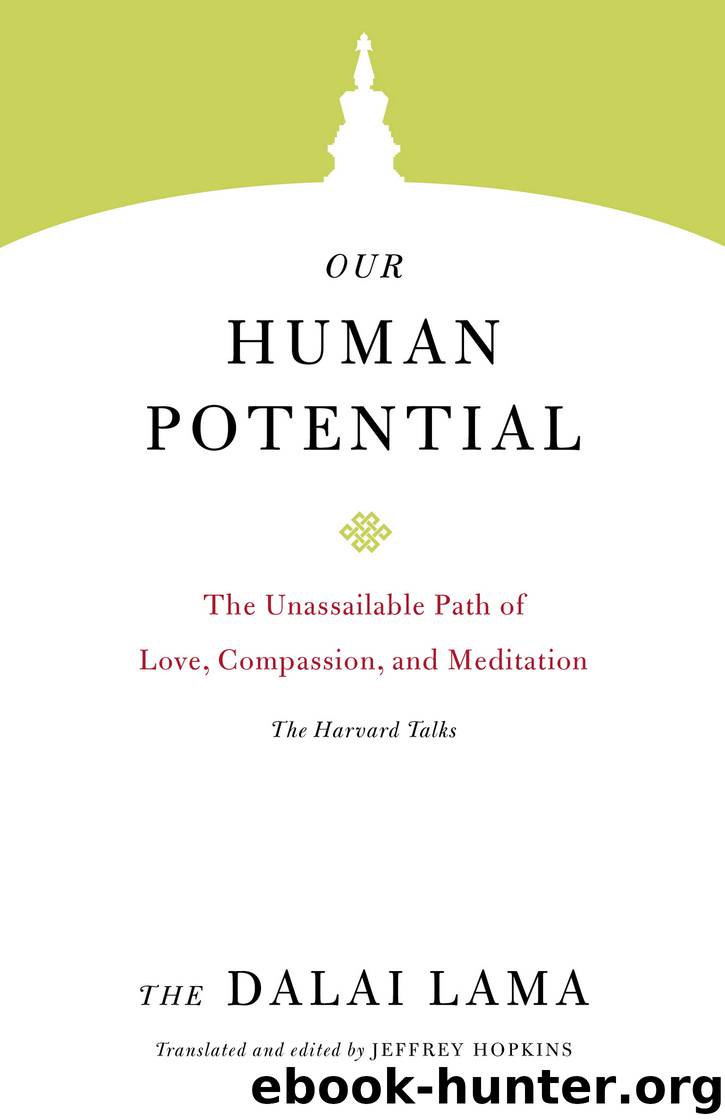Our Human Potential by The Dalai Lama

Author:The Dalai Lama
Language: eng
Format: epub
Publisher: Shambhala
Published: 2019-05-27T16:00:00+00:00
7. TECHNIQUES FOR MEDITATION
Thursday Morning
QUESTION AND ANSWER PERIOD
QUESTION: If desire and hatred cannot be experienced together, how do you explain the love-hate relationships we witness between two people who are very close to each other?
ANSWER: I was speaking about these occurring simultaneously, right in one second. During just the time when generating the mode of apprehension of desire, at that very time it is impossible to generate the mode of apprehension of hatred. But, in terms of a series of moments, in our own experience we know cases of very good friends or couples who alternate between fighting and being friendly.
QUESTION: Is it useful or advisable to be brought under hypnosis into one’s former lifetime and intermediate state in order to understand better one’s actual life?
ANSWER: I think that this depends on the situation of the particular person. For some people, it could help in that they would remember virtuous activities in former lifetimes and thereby be drawn into more in this lifetime. Also, there could be cases of people who would remember an awful event in the past which might cause them great anxiety.
QUESTION: What are the spiritual responsibilities of parents to their children?
ANSWER: This is very important. The future of children is very much related with their early period when they are with their parents. Education is gained from various schools, but education alone is just an instrument; the being or person, whether called “soul” or “self,” is what uses that instrument, and a person’s healthy development very much depends on family influence, the family atmosphere. In this respect, whether the parents are believers in religion or non-believers, the child’s becoming a good human being is their responsibility. This is not just a religious matter; it concerns helping children to become good and wholesome.
QUESTION: Since a Hearer does not set out to realize the emptiness of inherent existence but rather is attempting to realize a coarser emptiness, how can it be the case that Hearers actually become Foe Destroyers, Arhats?
ANSWER: A distinction has to be made between proponents of Hearer tenet systems and Hearer practitioners. Similarly, a distinction needs to be made between proponents of Great Vehicle tenets and Great Vehicle practitioners. For instance, there could be a person who, by school of philosophy, is a Proponent of the Great Exposition, a Hearer school, but, in terms of motivation, is a person of the Great Vehicle; in other words, there could be a Bodhisattva who, by school of philosophy, is a Proponent of the Great Exposition. Also, there could be a person who is a Consequentialist—a proponent of a Great Vehicle school—but, in terms of motivation, is a Hearer.
Nevertheless, whoever has reached the level of a Superior—someone who has directly realized emptiness—must be a Consequentialist. Still, this does not mean that anyone who accepts or knows the view of the Consequence School is necessarily a Consequentialist, just as all Buddhists do not have to be proponents of a philosophical school. In order for someone to be posited as
Download
This site does not store any files on its server. We only index and link to content provided by other sites. Please contact the content providers to delete copyright contents if any and email us, we'll remove relevant links or contents immediately.
| Confucianism | Feng Shui |
| I Ching | Jainism |
| Karma | Shintoism |
| Sikhism | Tao Te Ching |
| Taoism | Tibetan Book of the Dead |
| Zoroastrianism |
The Tao of Physics by Fritjof Capra(2272)
Human Design by Chetan Parkyn(2068)
The Diamond Cutter by Geshe Michael Roach(2058)
Feng Shui by Stephen Skinner(1937)
The Alchemy of Sexual Energy by Mantak Chia(1855)
Tao Te Ching by Lao Tzu(1834)
365 Tao: Daily Meditations by Ming-Dao Deng(1616)
Tao Tantric Arts for Women by Minke de Vos(1592)
Sun Tzu's The Art of War by Giles Lionel Minford John Tzu Sun(1531)
Sidney Sheldon (1982) Master Of The Game by Sidney Sheldon(1512)
Buddhism 101 by Arnie Kozak(1508)
Karma-Yoga and Bhakti-Yoga by Swami Vivekananda(1488)
The Analects of Confucius by Burton Watson(1429)
The Art of War Other Classics of Eastern Philosophy by Sun Tzu Lao-Tzu Confucius Mencius(1412)
The Way of Chuang Tzu by Thomas Merton(1361)
Tao te ching by Lao Tzu(1356)
The New Bohemians Handbook by Justina Blakeney(1350)
The Sayings Of by Confucius(1312)
Bless This House by Donna Henes(1267)
